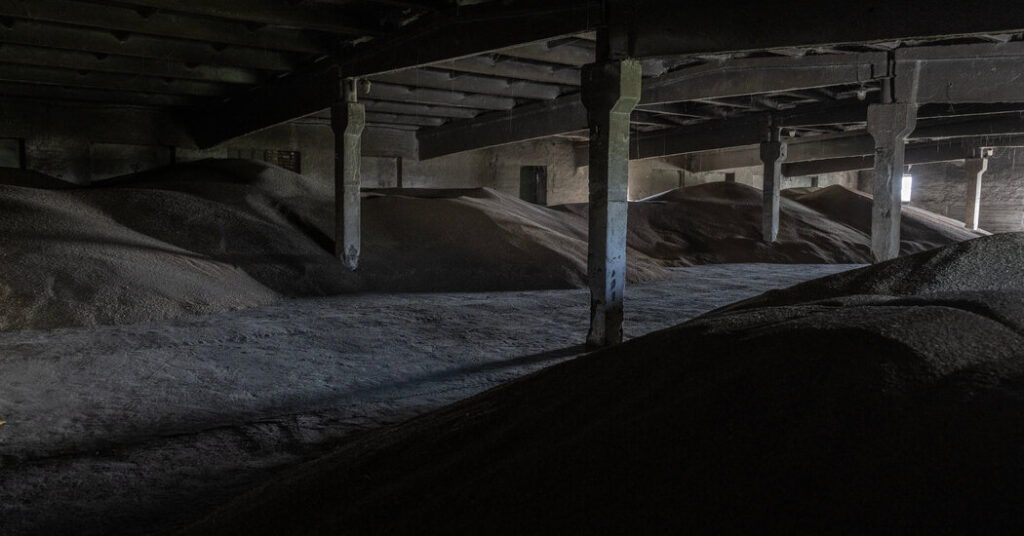Russia warned on Wednesday that it would consider any ship sailing around Ukrainian ports a military target, days after Moscow pulled out of a yearlong deal that had enabled Kyiv to export its grain across the Black Sea despite a wartime blockade.
Russia’s moves have profound implications for the export of Ukraine’s grain, a commodity vital for its own economy and world grain markets.
Here’s a look at alternative options for Ukraine to export its grain:
What is the immediate impact of Russia’s warning?
Russia’s Ministry of Defense issued a warning to ship operators and other nations on Wednesday suggesting that any attempt to bypass the blockade might be seen as an act of war. Global grain prices rose sharply following the announcement, but they remained lower than the prices when Russia launched its full-scale invasion of Ukraine in February 2022. The prices appeared to stabilize on Thursday.
One reason that prices did not rise further is that Ukraine’s grain exports under the Black Sea Grain Initiative had already slowed to a trickle in the days before Russia pulled out of the deal on Monday, according to Sal Gilbertie, head of Teucrium, a U.S.-based investment advisory firm.
How have Russia’s attacks on Ukrainian ports affected the situation?
Since Monday’s announcement, Russia has launched a series of nightly aerial attacks on Ukrainian ports, killing and wounding civilians. On Wednesday, an attack in Chornomorsk, just south of Odesa, also destroyed 60,000 tons of grain waiting to be loaded onto ships. That is enough to feed more than 270,000 people for a year, according to the World Food Program.
The aerial attacks appeared to reinforce Russia’s decision to end the deal and its refusal to allow Ukrainian exports via the Black Sea. They also heighten the stakes over how possible talks on reviving the deal could proceed.
Can Ukraine continue to export food across the Black Sea despite Russia’s threat?
President Volodymyr Zelensky of Ukraine spoke on Monday about establishing an agreement with Turkey and the United Nations, which helped broker the deal, to continue grain exports independent of Moscow. There has been no official response from either party to the idea. Russia’s warning on Wednesday, however, would likely put off commercial shipping companies and raise the price of any shipping insurance which, in turn, would make Ukraine’s grain more expensive on the international market.
What does it mean for shipping?
The prospects for a resumption now depend on military, diplomatic and commercial factors.
Six nations have a Black Sea coastline and it is a main conduit for Russia’s grain exports. Ukraine warned on Thursday that it would view Russian ships heading to Russian ports or ports in occupied Ukraine as carrying “military cargo, with all the corresponding risks.” It was too soon to tell what impact that would have on Russian exports.
Can the deal be revived?
Russia has said that from its perspective, the deal has been terminated rather than suspended, which makes the prospect of any quick revival less likely. In April, Moscow issued a series of demands that it wanted to be met in exchange for renewing the grain deal, including allowing its agricultural bank to be reconnected to the SWIFT payments system to make it easier to market its own grain, which it also ships across the Black Sea.
António Guterres, the United Nations secretary general, had made proposals on how to meet some of Russia’s demands but Moscow withdrew nonetheless. He has expressed disappointment at Russia’s decision, which he said would hurt people around the world facing food insecurity.
Turkey and China are big buyers of Ukrainian grain and could pressure President Vladimir V. Putin of Russia to accept a renegotiated deal, according to two analysts. Leaders of both countries have remained on good terms with Mr. Putin since the invasion began. Mr. Putin is also expected to visit Turkey next month, where he will hold talks with President Recep Tayyip Erdogan, a broker of the grain deal that was signed last year.
What are Ukraine’s alternatives?
Ukraine can transport its grain via road and rail into neighboring European countries, including Poland, as well as via barges on the Danube River to other Ukrainian ports at Izmail and Reni, as well as to the Romanian port of Constanta. These routes have sufficient capacity to export all of the country’s grain, according to Benoît Fayaud, deputy executive director of Strategie Grains, an agricultural economy research company.
However, exports via these routes are more expensive and, as a result, Ukrainian grain, currently among the cheapest in the world, would become less competitive, according to Arif Husain, chief economist for the World Food Program. To keep prices down, the amount paid to Ukrainian farmers would have to be lowered, negatively impacting future agricultural investment, he said.
“This Black Sea deal was a lifeline for the Ukrainian farmers,” he said.
Are road and rail routes still viable?
Last summer, the European Union took steps to smooth a path for Ukraine’s overland grain exports, given the Russian Black Sea blockade. However, after protests by farmers in some E.U. countries, the bloc allowed Bulgaria, Hungary, Poland, Romania and Slovakia to ban domestic sales of Ukrainian wheat, corn, rapeseed and sunflower seeds, though they still allowed the transit of those items for export elsewhere. The ban is expected to end on September 15.
Ministers from those five countries on Wednesday called for the bloc to allow the bans to be extended.
“From the perspective of the agricultural sector, the war in Ukraine has had increasingly serious repercussions on the agricultural market,” Poland’s prime minister, Mateusz Morawiecki, told reporters. “Such factors must be eliminated or changed. That is why we closed the borders for products from Ukraine when they flooded and destabilized the agricultural market.”
Monika Pronczuk contributed reporting.


